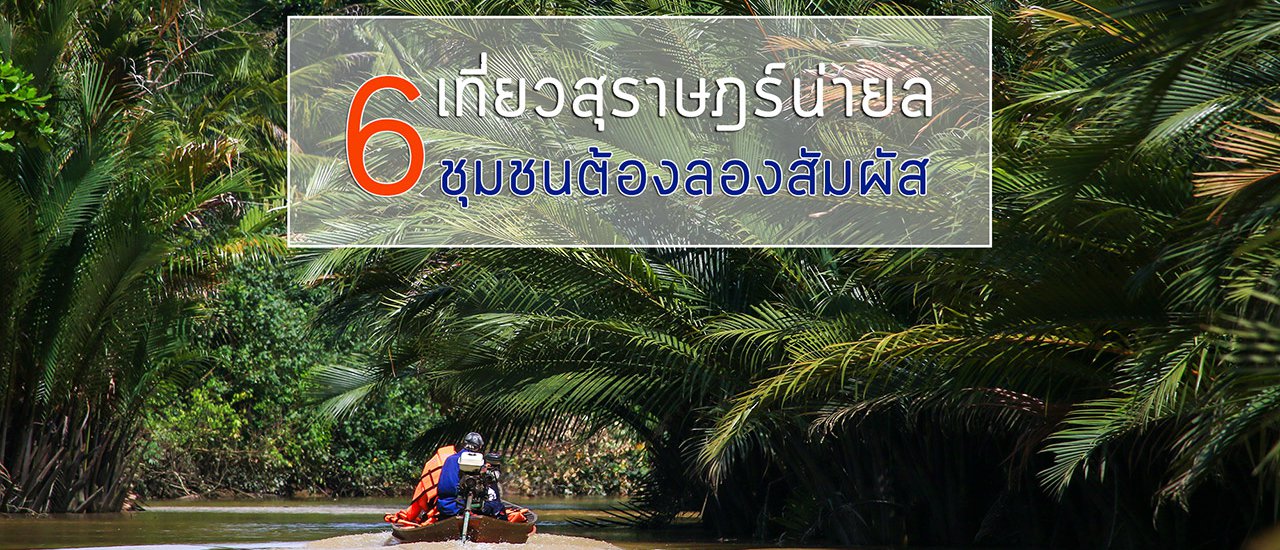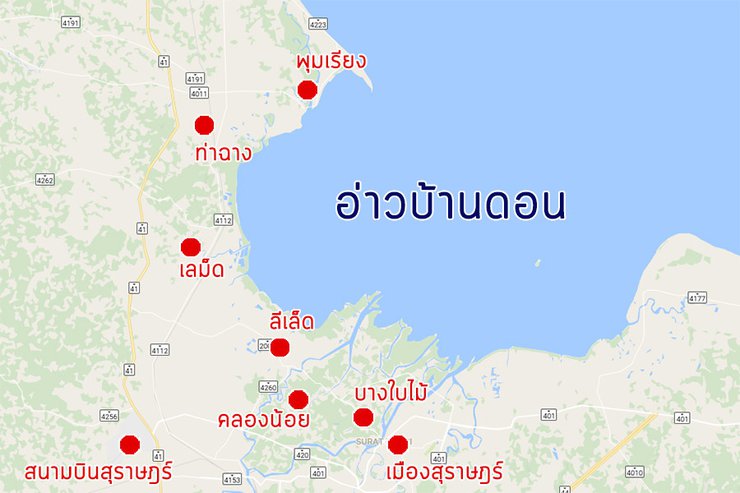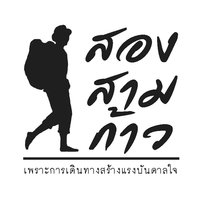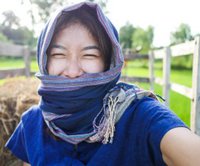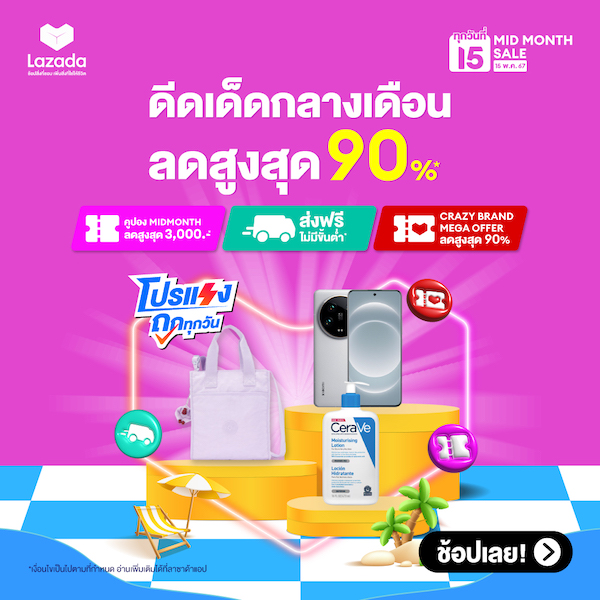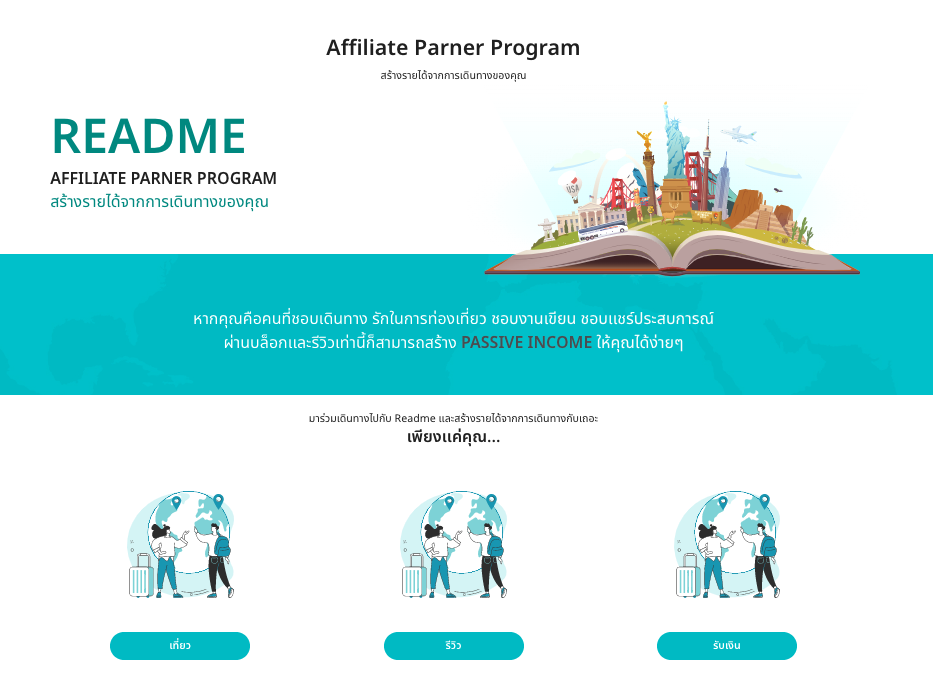If you tell someone you're going to Surat Thani, you can be sure that almost everyone will ask you if you're going to Koh Samui, Koh Phangan, or Khao Sok. There's no denying that these are the most popular tourist destinations in the province, and everyone should have the opportunity to experience their beauty at least once in their lifetime.
While the highlights of Surat Thani are certainly worth exploring, it's important to remember that there's much more to this region than meets the eye. In particular, the local communities offer a wealth of experiences for those seeking authentic cultural immersion. By engaging in community-based tourism, visitors can not only gain valuable insights into local life but also contribute directly to the well-being of residents.
Last May, I had the opportunity to travel to six communities: Bang Baimai, Lilet, Khlong Noi, Phum Riang, Lemat, and Tha Chang. It was a memorable trip, full of fun and learning experiences.

This article highlights the "Sustainable Tourism Development in Coastal Communities of Surat Thani" project, supported by Chevron Thailand Exploration and Production Ltd. and implemented by the Keenan Institute of Asia. The project aims to promote sustainable tourism practices in coastal communities, contributing to the region's economic and environmental well-being.
Traveling in local communities may not be as luxurious as five-star travel, but sometimes we may get more joy and smiles than we expected.
Bang Bai Mai Community
Bang Bai Mai Subdistrict, Mueang District
The residents of Surat Thani refer to this area as "Khlong Roi Sai" (Hundred Canals) due to the countless natural canals branching off the Tapi River. Another name, "Nai Bang," roughly translates to "within the canals," highlighting the area's charm. The community of Bang Baimu is one such example, where residents continue to embrace their simple, traditional way of life.
This riverside community has been deeply connected to the water for generations. While roads have significantly reduced the use of boats for transportation, and many things have changed, the essence of Bang Baimu remains.

Every Sunday, from nine in the morning until around four in the afternoon, tourists have an appointment with the Bang Bai Mai Community Market. It's a charming market that provides a space for local people to sell their goods, with a strong emphasis on delicious food, local snacks, and typical market fare, as well as locally produced products such as fresh-squeezed orange juice and palm sugar. Be sure to come hungry!




The highlight of the trip is a boat ride through the lush scenery on both sides of the canal. The most impressive section is where the nipa palms grow densely, their branches stretching towards each other to form a natural tunnel. The boat ride costs only 20 baht per person and is a short but incredibly enjoyable experience.



While a simple paddle boat may not be enough to satisfy your adventurous spirit, some boats offer the opportunity to take a long-tail boat ride, expanding your view of the intricate network of canals. During this ride, you can stop by Uncle Song's garden for a demonstration on how coconut oil is made. The highlight of this experience is the use of a local coconut variety called "Ma Phrao Gaeng," which grows in both fresh and saltwater, a unique characteristic that sets it apart from other coconuts. This special quality translates into a distinctive coconut oil with its own unique properties.

Under the "Phrao Thai" brand, a wide variety of coconut and coconut oil-based cosmetic products, including shampoos, soaps, hair conditioners, facial cleansers, skin creams, lip balms, and more, are available at significantly lower prices than market rates. Take advantage of this opportunity to stock up on these high-quality products.


If you visit Bang Bai Mai, be sure to pay your respects to Luang Pho Khao Suk, a revered Buddha statue enshrined within the Bang Bai Mai temple hall. This unique statue was crafted from leftover rice collected from monks' alms bowls and then covered in brass. It is held in high esteem by the local community.

Contact the Bang Baimai Community: 081-607-4935
Long-tail boat price: 500 baht per boat for up to 5 people. For more than 5 people, an additional 100 baht per person will be charged. The tour lasts approximately two hours.
Leelet Community
Leelet Subdistrict, Phunphin District
As the boat glided through the Pung Pin Canal, lush mangrove forests lined both sides, eliciting gasps of awe from everyone on board. The title of "ASEAN of Thailand" bestowed upon the Leelet community is not an exaggeration. The beauty of the scenery is undeniable, even if it may not rival the grandeur of the Amazon.
Leelet is a coastal community closely connected to the mangrove forest and Ban Don Bay. It stands out as one of the country's most significant freshwater receiving points (receiving water from the Tapi River), resulting in a diverse range of flora and fauna.


According to Kamnan Prasit Chanjukorn, the mangrove forest in Lile was severely degraded in the past. However, since the establishment of a conservation group in 2005, the mangrove forest has been restored and expanded by over 2,000 rai. Currently, the forest covers an area of approximately 8,000 rai and continues to expand.
These mangrove forests require minimal planting, as long as they are conserved and not destroyed. This is because the area has a unique characteristic of land encroaching on the sea, meaning that as the forest grows, more sediment accumulates, reducing the area covered by water. The main tree species along the canals are Sonneratia caseolaris, while Rhizophora apiculata and Bruguiera gymnorrhiza are found near the mouth of the bay.


As we sail out of the canal into Ban Don Bay, we will witness a variety of traditional fishing practices. These include casting nets, catching fish, and using scoop nets (similar to cast nets) to trap krill, which is the raw material for the excellent shrimp paste of Lelet.




When setting crab traps, if the catch is too small, it is released back into the sea. However, for larger crabs like this one, we regret to inform them that they will become a delicious meal for us.


The area boasts numerous nature study bridges, offering stunning views. Immerse yourself in the verdant mangroves and breathe in the fresh sea air, leaving you feeling refreshed and rejuvenated.


Contact Lilek Community: 061-174-7445, 095-257-4428
Long-tail boat price: 1,500 baht per boat, accommodating approximately 8 people
Homestay accommodation: Currently only available for study groups of 10 people or more.
Khlong Noi Community
Khlong Noi Subdistrict, Mueang District
Despite its name, "Khlong Noi" (meaning "small canal"), this community boasts an abundance of waterways. As part of the Khlong Roi Sai network, Khlong Noi offers a charming glimpse into rural riverside life. Whether you're seeking an educational experience exploring the community's way of life or a relaxing getaway, Khlong Noi has something for everyone. Standard homestays are available for those wishing to immerse themselves in the local culture.

One of the most remarkable features of the Khlong Noi community is the monkey training school for coconut climbing. This school serves as a custodian of local wisdom, showcasing the age-old bond between humans, monkeys, and coconut plantations in Surat Thani.
It is recommended to take a boat trip to this destination, where you will witness a demonstration of monkeys trained to climb coconut trees. These monkeys are long-tailed macaques, carefully selected from a docile lineage with no aggressive tendencies. Training begins at the age of three and takes approximately 40 days. However, it takes a year or two of real-world experience for them to become truly proficient and agile.



The training method is divided into four steps: entering the keyboard, hanging and spinning, climbing the pole, climbing the tree, and finally untying the rope. This step is the ultimate test. If the rope is tangled, these monkeys know how to untie it, even though sometimes we ourselves may be confused.
This is a comprehensive monkey training center that offers a full range of services, including breeding, training for coconut harvesting, and even buying and selling monkeys. Established in 2006, the center currently houses approximately 30 monkeys.



In addition, we will have the opportunity to take a boat trip to see coconut shell products, woven products, local snacks, traditional wooden boat building, and various fruit orchards, all of which are highly dependent on the season.



The final stop was an overnight stay at the Khlong Noi community homestay, which has been certified by government agencies. There are about ten houses available, and the nights are quiet, with a sky full of stars and fireflies flickering in the Lamphu trees. It was truly a sight that brought a wide smile to our faces.
Visitors interested in activities such as river prawn fishing, fish trapping, and firefly boat tours can contact the local community or their accommodation for arrangements.




Contact Khlong Noi Community 089-728-2810, 082-411-6357
Long-tail boat price 1,000 baht per boat, can accommodate approximately 8 people
Homestay accommodation price 100 baht per person, food price 120 baht per person per meal
Phum Riang Community
Phum Riang Subdistrict, Chaiya District
A long-tailed boat with an engine sailed out into the sea of Ao Ban Don Bay. A small island was visible in front, called Ko Sret or Ko Samret. This is the place where the Phum Riang people took us to study nature and observe the authentic way of life of the seafaring people.
Phum Riang is a saltwater community in Chaiya district with a long history. It is believed to have been an important trading port in the past. It is also the birthplace of Buddhadasa Bhikkhu, a revered monk in Thailand.


Ko Sesit is a small sandbar island located in the middle of Ban Don Bay. According to the Department of Marine and Coastal Resources, the island is officially named Ko Hua Sesit and covers an area of only 0.012 square kilometers. Despite its small size, the island plays a crucial role as a mangrove forest in the middle of the sea, serving as a breeding and nursery ground for numerous marine animals.



After visiting the island, the villagers of Phum Rieng took us to plant coconut trees. Previously, they had planted mangrove forests, specifically Rhizophora trees. However, strong monsoon winds caused the trees to die before they could mature. As a result, they decided to let the forest grow naturally and instead turned to planting coconut trees.


Next, we raked for white clams or mussels, which are abundant on the sandy beach. In the muddy areas, we had fun digging for razor clams, with their delicious white flesh.




This demonstrates a coastal fishing method known as pair trawling, where two nets are spread in a circle and pulled towards the shore to catch shallow-water fish.



After finishing the island trip, the community returned to the shore. They have established a horseshoe crab bank, which means raising the caught egg crabs until they lay eggs and then releasing the baby crabs back into the sea. In this way, we will have crabs to eat for a long time, and we will not catch and eat all the egg crabs, leaving no breeding stock.

If you crave fresh seafood, there's plenty to choose from. But for me, the highlight is the "khai mok," a local delicacy that showcases traditional wisdom in food preservation. Traditionally, seafaring communities used egg whites to coat their fishing nets. Rather than discarding the leftover yolks, they ingeniously combined two yolks, preserved them with salt, and grilled them to create a fragrant and delicious treat that pairs well with any dish.
The Phum Riang community is not yet ready to open homestays for tourists. However, a one-day trip can still be a memorable experience.

Contact Phum Riang Community 092-3793969, 099-3199570, 082-2727956
Long-tail boat trip to Koh Saechat costs 1,200 baht per boat, accommodating approximately 5 people.
Tha Chang Community
Khao Than Subdistrict, Tha Chang District
Large-tailed boats slowly sailed along the Tha Chang Canal to Ban Don Bay. That's why we saw small and large huts lined up in the middle of the sea. This is one of the largest cockle farms in our country and a community tourist attraction that is definitely worth experiencing.



The clam farming industry in Tha Chang originated approximately twenty years ago when a law prohibiting the use of destructive fishing gear, such as push nets, was implemented. Local residents turned to clam farming as an alternative livelihood, utilizing the naturally suitable conditions of Ao Ban Don Bay. This practice has continued to this day, while the destructive push net fishing method has gradually declined and disappeared from the sea, contributing to the preservation of marine resources.
Tha Chang is a community that has received the Green Globe Award after starting conservation efforts in 1999. Currently, there are over 4,700 rai of mangrove forests along the coast. We can rent a boat to visit the abundant marine life nursery or participate in tree planting activities.
Despite its diverse offerings, the highlight of the trip remains the opportunity to go clam digging by boat. This allows visitors to witness the unique methods employed for harvesting clams, which differ depending on the tide.



Spend the afternoon relaxing on a farmstay-style stilted hut, enjoying fresh seafood. You can even catch your own fish for an unparalleled level of freshness.



On the shore at Tha Chang, there are natural hot springs for bathing. You can access them through the Tham Nam Ron Hot Spring Monastery. These hot springs are untouched and offer a truly local experience. Locals often come here to soak in the hot springs for health benefits in the evenings. Additionally, you can apply black mud, which is rich in skin-nourishing minerals.
This kind of fun trip is a highlight of Tha Chang.

The village of Laem Met, pronounced similarly to the island of Koh Samet, is often mistakenly addressed as "Koh Samet" on envelopes, much to the amusement of the locals. However, Laem Met bears no resemblance to the island, being a rural community surrounded by verdant rice fields and quacking duck pens.

Contacting Tha Chang Community
Phone: 061-243-4076, 061-508-2767
Boat Prices
- Small long-tail boat: 1,500 baht (maximum 7 passengers)
- Large long-tail boat: 2,500 baht (approximately 20 passengers)
Farmstay Prices
- Accommodation: 200 baht per person
- Lunch/Dinner: 200 baht per person per meal
- Breakfast: 80 baht per person
Location
Lemat Community, Lemat Subdistrict, Chaiya District
The name "Lemat" is pronounced "La-met," similar to the island of Koh Samet. Locals often laugh and point out that the address on envelopes frequently misspells the village as "Samet." However, Lemat bears no resemblance to the island, being a rural community surrounded by verdant rice paddies and the cacophony of quacking ducks.


The Lemat community is renowned for its salted egg production. The specific location we visited was in Village 5, where the "AS.M. Salted Eggs" brand is produced. This brand is associated with the "Volunteer Health Assistants" (AS.M.) program. If you're looking for salted eggs from Chaiya, this is the place to go.

The community enterprise group in Village 5 was established approximately fifteen years ago in response to a rice farming crisis caused by the golden apple snail infestation. The provincial agricultural department promoted duck raising as an alternative. However, the abundance of ducks led to a surplus of duck eggs, prompting the idea of forming a salted egg enterprise group. The group developed a recipe that has become a renowned five-star OTOP product.
Visitors can witness the salted egg production process firsthand. Group members take turns making salted eggs daily, carefully selecting egg sizes, applying a mixture of mud and salt, coating them in rice husk, and storing them in basins. The group produces thousands of eggs daily due to the high volume of orders.



The traditional recipe for salted eggs from Chai Nat: three days for sweet boiled eggs, seven days for fried eggs, and ten days for salted eggs. If you are traveling in a group, you can contact the community in advance to arrange a dessert menu to welcome you, which is salted egg dumplings. It's delicious, don't tell anyone!

Interestingly, this region is the origin of Hom Mali Chaiya rice, a fragrant rice variety with a long history. Legend has it that the aroma of this rice fills the fields during harvest and the homes during cooking. Sadly, Hom Mali Chaiya rice is facing extinction. However, visitors during the rice-planting season can witness demonstration plots, visit the white rice mill, and learn about the production of riceberry rice.
Note: "ไข่เค็ม อสม." refers to salted eggs produced by the Village Health Volunteers (ASMs) in Thailand. These eggs are not typically available in souvenir shops like other commercial brands. To purchase them, you must either visit the community directly or place an order through them. Due to high demand, production is already at full capacity.

Purchase salted eggs and pay respects at the Chaiya Phra Borommathat, a prominent southern pagoda nearby.


Contact the Lemed Community
Phone: 063-3278172, 091-8264621, 089-3905030
Follow my travel adventures on another channel.
http://www.facebook.com/alifeatraveller
นายสองสามก้าว / A Life, A Traveller
Tuesday, October 8, 2024 11:17 AM

